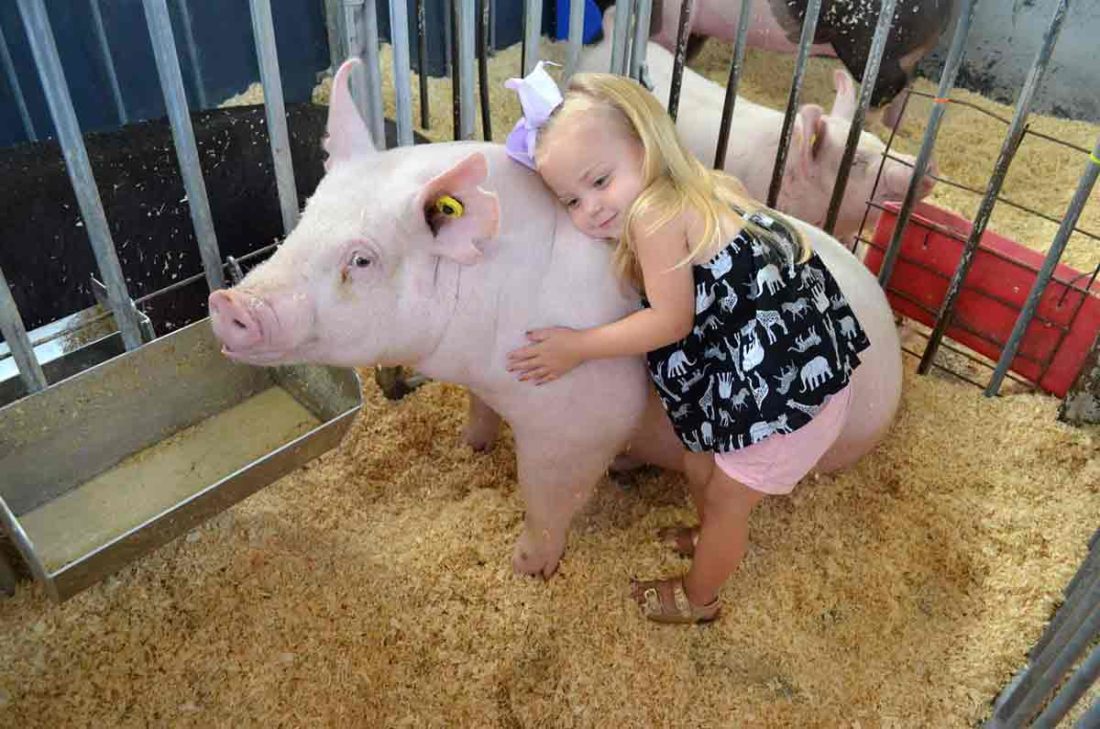‘We’re taking on water fast’
-
-Messenger photo by Kriss Nelson
Lola Marlow of Broken Arrow, Oklahoma, gives “Peppa Pig” a hug during the World Pork Expo held last week in Des Moines

-Messenger photo by Kriss Nelson
Lola Marlow of Broken Arrow, Oklahoma, gives “Peppa Pig” a hug during the World Pork Expo held last week in Des Moines
DES MOINES — National Pork Producers Council officials said they’re not done fighting yet, although they feel beaten up from recent trade disputes, during a kickoff event to the 30th annual World Pork Expo last week.
Trade and tariffs were among the biggest topics discussed during a media event at the expo in Des Moines.
Neil Heimerl, president of the NPPC, discussed many of the items the organization will be working on for the remainder of the year during the event, including trade.
“Of course, trade is on everybody’s mind and obviously the top priority,” he said.
Heimerl had considered showing up to the press conference wearing bandages as a sign to show how beat up he and other pork producers are feeling. This was mostly due to a 25 percent additional duty put on U.S. pork back in April from China and, most recently, tariffs put on U.S. pork from Mexico earlier last week.
“These moves are retaliation for U.S. tariffs on steel and aluminum imports,” he said. “Iowa State University economist Dermot Hayes has calculated, since March 1, that hog futures have dropped $18 a head and they are still falling. That’s a $2.2 billion industry loss on an annualized basis.”
Not all of that can be attributed to the issues with China. Heimerl said the friction and rumors that surround the market are the main factor.
“We need to get this fixed now,” he said. “Mexico is a No. 2 export for U.S. pork and China is No. 3. We appreciate all of the trade issues the administration is balancing, but we are starting to take on water fast.”
Heimerl said President Donald Trump has said he wouldn’t abandon farmers and they continue to take him for his word. But Heimerl emphasized these trade disputes need to end immediately.
As threats of tariffs and losing NAFTA grow, Heimerl said through it all, it is imperative farmers maintain — as well as expand — existing markets and open new ones.
“Exports are absolutely essential to the U.S. pork industry,” he said. “Last year, our industry exported $6.5 billion. That represents 27 percent of what we produce in this country of our total production.”
He added the NPPC understands farmers are in a new trade environment, and the Trump administration is cautious when it comes to trade agreements. Additionally, the NPPC is continuing to urge the administration to stay in NAFTA and ensure negotiation deals maintain zero tariffs on pork exports.
In the meantime, the NPPC continues to look for other opportunities to increase U.S. pork exports.
“We are already doing that,” he said. “We did just open Argentina and Paraguay to U.S. pork exports and South Africa to take more cuts of pork. We are also looking at places such as Brazil and Indiana, so we are always looking for new opportunities, but we need to make sure we gain the ones we have lost.”
Nick Giordano, vice president and counsel of global government affairs for the NPPC, elaborated more on the trade issues facing pork producers and farmers.
“There are a myriad of trade disputes going on right now,” said Giordano. “There are negotiations with NAFTA, repositioning the trade relationship with China. So it’s the No. 1 issue that NPPC is getting after. You haven’t seen us with a real high profile in the media, but producer leadership and staff are hard at work with the administration.”
“We are concerned about the 25 percent tariffs from Mexico and in China. We’re concerned about the tendency to escalate potential tariffs. We are concerned about Canada.”
He said the NPPC continues to work closely with the administration.
“How many times has the president, the U.S. secretary of agriculture and other high levels of administration officials said that they’re not going to leave farmers out in the cold?” Giordano asked. “And it’s very painful for us. We’re the biggest single sector in the U.S. right now that is taking it on the chin.”
He gives a lot of credit to pork producers for being very measured and very patient and being willing to wait and give Trump, USDA Secretary Sonny Purdue and other members of the cabinet and officials who are engaged in these disputes to “get things right.”
This isn’t the first scare the industry has seen in the past year.
“If you will recall, Labor Day we had a near-death experience with the Korean free trade agreement,” Giordano said. “We were really concerned and it turned out that the deal was renegotiated. So we are hopeful.”
He added producers are definitely in a difficult place with Mexican and Canadian trade partners, as they are unhappy about the steel and aluminum tariffs, but the NPPC has made sure the Trump administration is hearing their message on just how hard this had been for producers and how much they need federal leaders to come through.
“It’s an uphill climb, and our message is. ‘we’re taking on water fast,'” Giordano said. “There’s a lot of blood on the floor, but we’re giving this administration the benefit of the doubt and they have said repeatedly they are going to work with us and we’re going to work with them.”
While he couldn’t go into detail regarding the talks between the Trump administration and the NPPC, Giordano said they do understand how difficult this has been for producers.
“We talk all of the time at the highest levels of the government and I wish I could tell producers that everything is going to be OK,” he said. “But we can’t tell them that. We don’t know.”
What can be done to help offset some of the tough financial times U.S. pork producers and farmers are facing?
“I guess the single best thing that people can do — and maybe we’re remiss from not being more vocal in the media because we are the ones really taking it on the chin here,” Giordano said, “but maybe the best thing people can do, whether they are Democrats or Republicans, or where they are with things with China and Mexico or trade in general, there are a lot of innocent pork producers who are bystanders in this, who employ a lot of people and do a lot of good things, are taking on water fast, so maybe the best thing the general public can do is very simple. Eat more pork. We would really appreciate that. Because I will tell you what, our folks are being patriots here.”
Other issues
Trade wasn’t the only topic NPPC officials discussed last week. They also talked about finalizing the 2018 farm bill.
Specifically, Heimerl said they’ve been working with government officials on asking for funding for a vaccine bank to combat an outbreak of foot and mouth disease.
“As we know, the U.S. doesn’t have enough FMD vaccine or ability to produce it to even handle a medium-sized outbreak,” he said. “If we have an outbreak now, the cost just to the pork and beef sector could reach $120 billion over the next 10 years. Corn and soybean farmers would have losses of $70 billion.”
The NPPC is asking congress for $115 million a year for the next five years in this farm bill for a vendor-managed FMD vaccine bank, as well as funding for federal diagnostic laboratories and state disease prevention efforts.
On a regulatory front, Heimerl said there are still issues that need resolved with the Waters of the U.S. rule.
“The Trump administration as agreed to rescind the rule, but the EPA (Environmental Protection Agency) needs to rewrite regulations,” he said.
Another regulation the NPPC is addressing is with the federal Department of Transportation’s hours of service rule for truck drivers.
“This regulation is incompatible with hauling livestock,” Heimerl said. “We are asking the Department of Transportation for some flexibility.”
He added the NPPC works with dozens and dozens of issues throughout the year.
“We’re not throwing rocks at the administration,” he said. “They are our allies. We work with them. They hear us. They hear what we are saying. They didn’t put the tariff on us, so we hope they work with us to get this all resolved.”







